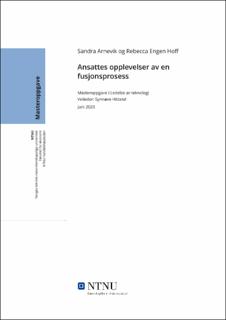| dc.description.abstract | Forskning indikerer at over halvparten av endringsforsøk mislykkes eller ikke går som planlagt, men også at ansattes påvirkning og innflytelse har stor betydning for utfallet. I de siste årene har fusjoner vært populære endringsprosesser, hvor vekst og andre synergier ofte søkes. Målet med denne studien er å gi ytterligere innsikt på området ved å besvare problemstillingen: «Hvordan opplever ansatte en fusjonsprosess?» Det er utarbeidet tre forskningsspørsmål for å belyse problemstillingen. Disse omhandler ulike faser av fusjonsprosessen, hvor det fokuseres på ansattes opplevelser av forberedelse og gjennomføring, samt hvordan ansatte opplever den nye organisasjonen.
For å besvare problemstillingen er det benyttet en kvalitativ metode og utført en enkelt-casestudie. Casen oppgaven tar utgangspunkt i, er en fusjonsprosess mellom to entreprenørselskap i energibransjen. Datainnsamlingen ble gjort gjennom tolv semi-strukturerte dybdeintervju med informanter fra ulike deler av hierarkiet i de fusjonerte selskapene. For å belyse problemstillingen er det tatt utgangspunkt i teori om faser i endringsprosesser, med fokus på noen elementer som inngår i disse fasene. Dette inkluderer blant annet teori om planlegging, kommunikasjon, involvering, motstand og organisasjonskultur. I tillegg er det benyttet teori spesifikt tilknyttet fusjoner.
Våre funn viser at det er flere elementer i ulike faser av fusjonsprosessen som har betydning for hvordan ansatte opplever prosessen. I tråd med tidligere forskning ble det også funnet at ansatte opplevde fusjonsprosessen ulikt. Først og fremst tyder funnene på at ansatte opplevde mangler i opptiningsfasen av fusjonsprosessen, mer spesifikt mangler tilknyttet planlegging og kommunikasjon under forberedelsen av fusjonen. Mangler i opptiningsfasen har også påvirket de etterfølgende fasene, hvor ansatte opplevde et fravær av tydelige retningslinjer. Uavhengig av om ansatte var positive eller negative til fusjonen, opplevde flere motstand til endringen i form av misnøye og usikkerhet. Funnene tyder også på at endringene fusjonen medførte for de ansatte til en viss grad har vært undervurdert, noe som kan ses i sammenheng med et større fokus på økonomiske aspekter enn fokus på den menneskelige dimensjonen. I nedfrysningsfasen av prosessen har det blitt et økt fokus på konsensusbygging og samarbeid, og flere ansatte føler tilhørighet til det nye selskapet og opplever det som én organisasjon. | |
| dc.description.abstract | Research indicates that more than half of change processes fail or turn out differently than planned, but also that employees’ influence on change processes have a large impact on the outcome. In recent years, mergers have gained popularity as a change process, whereas companies seek growth and to capture synergies. The aim of this study is to provide further insight on this issue by answering the following research question: «How do employees experience a merger?» To examine this, we have proposed three research sub-question. These questions deal with different stages of the merger, focusing on how employees experienced the preparation and execution, and how employees experience the new organization.
To answer our research question, we have used a qualitative research method and conduced a single case study. This study is based on a merger between two contractors in the energy industry. The empirical data was gathered through twelve semi-structured in-depth interviews with informants from different levels within the hierarchy of the merged companies. Furthermore, to examine the research questions, the thesis focuses on theory regarding the stages of change, with emphasis on planning, communication, involvement, resistance and organizational culture. In addition to theory specifically regarding mergers.
Our findings show that there are several factors, in different stages of the merger, that influence employees experiences. In line with earlier research, it was also found that employees experience the merger differently. First and foremost, the findings indicate that employees have experienced deficiencies during the unfreezing stage of the merger process, more specifically deficiencies regarding planning and communication during the preparation of the merger. Deficiencies during the unfreezing stage also affected the subsequent stages, where employees experienced an absence of clear guidelines. Regardless of their attitude to the merger, positive or negative, employees experienced dissatisfaction and uncertainty during the process. Furthermore, the findings also indicate that the changes the merger entailed for the employees, to a certain degree was underestimated. This can be seen in relation to a greater focus on financial aspects than aspects regarding employees. During the refreezing stage of the process, there has been an increased focus on building consensus and collaboration. In addition, several employees have developed a feeling of belonging to the company and experience the company as an integrated organization. | |
